- Home
- Jack Canfield
A 2nd Helping of Chicken Soup for the Soul Page 10
A 2nd Helping of Chicken Soup for the Soul Read online
Page 10
Will You, Daddy?
It's strange, the things you remember. When life has crumbled suddenly, and left you standing there alone. It's not the big important things that you remember when you come to that, not the plans of years, not the love or the hopes you've worked so hard for. It's the little things that you remember then, the little things you hadn't noticed at the time. The way a hand touched yours, and you too busy to notice, the hopeful little inflection of a voice you didn't really bother to listen to.
John Carmody found that out, staring through the living-room window at the cheerful Tuesday afternoon life of the street. He kept trying to think about the big important things, lost nowthe years and the plans, the hopes and the love. But he couldn't quite get them focused sharply in his mind just nownot this afternoon.
Those important things were like a huge nebulous background in his mind. All he could remember now was a queer little thing: nothing, really, if you stopped and thought about it in light of the years and the plans and the great love. It was only something his little girl had said to him one evening, twoperhaps three weeks ago. Nothing if you looked at it rationallythe sort of thing that kids are always saying.
Page 91
But it was what he was remembering now.
That particular night, he had brought home from the office a finished draft of the annual stockholders' report. It was very important. Things being as they were, it meant a great deal to his future and to the futures of his wife and his little girl. He sat down to re-read it before dinner. It had to be right; it meant so much.
And just as he turned a page, Marge, his little girl, came with a book under her arm. It was a green-covered book, with a fairy tale picture pasted on it. She said, "Look, Daddy."
He glanced up and said, "Oh, fine. A new book, eh?"
"Yes, Daddy," she said. "Will you read me a story in it?"
"No, dear. Not just now," he said.
Marge just stood there as he read through a paragraph that told the stockholders about certain replacements in the machinery of the factory. And Marge's voice, with timid and hopeful little inflections, was saying, "But Mummy said you probably would, Daddy."
He looked up over the top of the typescript. "I'm sorry," he answered. "Maybe Mummy will read it to you. I'm busy, dear."
"No," Marge said politely, "Mummy is much busier upstairs. Won't you read me just this one story? Look, it has a picture. See? Isn't it a lovely picture, Daddy?"
"Oh, yes. Beautiful," he said, "Now that picture has class, hasn't it? But I do have to work tonight. Some other time . . . "
After that, there was quite a long silence. Marge just stood there with the book open at the lovely picture. It was a long time before she said anything else. He read through two more pages explaining in full detail, as he had directed, the shift in markets over the
Page 92
past 12 months, the plans outlined by the sales department for meeting these problems which, after all, could safely be ascribed to local conditions, and the advertising program that after weeks of conferences had been devised to stabilize and even increase the demand for their products.
"But it is a lovely picture, Daddy. And the story looks so exciting," Marge said.
I know," he said. "Ah . . . Mmmmm. Some other time. Run along now."
"I'm sure you'd enjoy it, Daddy," Marge said.
"Eh? Yes, I know I would. But later . . . "
"Oh," Marge said. "Well, some other time then. Will you, Daddy, some other time?"
"Oh, of course," he said. "You bet."
But she didn't go away. She still stood there quietly, like a good child. And after a long time, she put the book down on the stool at his feet and said, "Well, whenever you get ready, just read it to yourself. Only read it loud enough so I can hear, too."
"Sure," he said. "Surelater."
And that was what John Carmody was remembering now, not the long plans of love and care for the years ahead. He was remembering the way a well-mannered child had touched his hand with timid little fingers and said, "Just read it to yourself. Only read it loud enough so I can hear, too."
And that was why, now, he put his hand on the book from the corner table, where they had piled some of Marge's playthings, picking them up from the floor where she had left them.
The book wasn't new anymore, and the green cover was dented and thumbed. He opened it to the lovely picture.
And reading that story, his lips moving stiffly with anguish to form the words, he didn't try to think
Page 93
anymore, as he should be thinking, about the important things, about his careful and shrewd and loving plans for the years to come, and for a little while he forgot, even, the horror and bitterness of his hate for the drunken driver who had careened down the street in a second-hand car, and who was now in jail on manslaughter charges.
He didn't even see his wifewhite and silentdressed to be with Marge for the last time, standing in the doorway, trying to make her voice say calmly, "I'm ready, dear. We must go."
Because John Carmody was reading:
"Once upon a time, there was a little girl who lived in a woodcutter's hut, in the Black Forest. And she was so fair that the birds forgot their singing from the bough, looking at her. And there came a day when . . . "
He was reading it to himself. But loud enough for her to hear, too. Maybe.
Michael Foster
Yunkster Gazette
Submitted by Martin Louw
Page 94
But You Didn't
I looked at you and smiled the other day
I thought you'd see me but you didn't
I said I love you'd and waited for what you would say
I thought you'd hear me but you didn't
I asked you to come outside and play ball with me
I thought you'd follow me but you didn't
I drew a picture just for you to see
I thought you'd save it but you didn't
I made a fort for us back in the woods
I thought you'd camp with me but you didn't
I found some worms 'n such for fishing if we could
I thought you'd want to go but you didn't
I needed you just to talk to, my thoughts to share
I thought you'd want to but you didn't
I told you about the game hoping you'd be there
I thought you'd surely come but you didn't
I asked you to share my youth with me
I thought you'd want to but you couldn't
My country called me to war, you asked me to come home safely
But I didn't.
Stan Gebhardt
Page 95
Graduation, Inheritance & Other Lessons
''It is with great pleasure that I present to you the 1978 graduating class of Drake University. These students have successfully completed their college studies: Michael M. Adams; congratulations, Michael. Margaret L. Allen; congratulations, Margaret."
He was so damn bullheaded! How could he not feel the torment of my urgency to go to college? How could he have possibly conjured up the idea that "if it's to be of meaning, it'll be accomplished on your own"? Damn him!
"John C. Anderson. Congratulations, John. Bettie J. . . . "
One day he would see that I had done it on my own and he would feel remorse that he hadn't been a part of it, repentant and apologetic that he didn't actively follow mefreshman, sophomore, junior, senior . . . a college graduate.
" . . . Burres. Congrat . . . "
There. I did it! I had made it through the vast land of ambiguity and bureaucratic hurdles. Collegethe test to measure your tolerance to stress! Four arduous years, and the prized sheepskin was mine. The scroll with my name inscribed on it confirmed it. Thanks a lot, Dad! I've longed for you to be supportive of me; to be proud of me; to think I was somebody special, really special. What happened to all those childhood
Page 96
lectures on accomplishing whatever you set your heart
on? On principles, goals, work ethics and discipline? Where were the fatherly pats on my head along the way? What was so important that you couldn't tear yourself away to come to visit on parents day as all the other parents did?
And now, a no-show on graduation day. How could your day possibly be more consequential? How is it possible that you couldn't arrange your day to watch your daughter on this momentous event in her life?
" . . . ulations, Bettie."
Against all hope I searched for his eyes in the sea of several thousand faces in the audience. He was nowhere to be found. Naturally. My going off to college coincided with the birth of my parents' sixth child and other routines of a large and rural family. Why should he think of this day as anything out of the ordinary?
"Climb every mountain. Ford every stream." The song our graduation class had chosen for the theme seemed appropriately trite. And painful.
"Follow every rainbow . . . till you find your dream."
One hundred and two new graduates marched across the stage that day. I was sure that every one of them had two parents wedged in the crowded audience. When every graduate had picked up his or her diploma, our class rose and began the long march down the auditorium aisle, all of us ready to get out of sweaty gowns and prickly pins and rush off to the dinners and family graduation parties. I felt so alone. Saddened. Angry. I had sent Dad not one but two graduation invitations. It wasn't so much that I wanted him there, but that I needed him. Needed him to witness the completion of something very special, an outcome of all those dreams, ambitions and goals he had instilled in me. Didn't he know how much his
Page 97
approval of this meant to me? Were you serious, Dad, or was it just talk?
"Dad, you are coming, aren't you? I mean, how many times does one graduate from college?" I had pleaded.
"Our coming will depend on whether we're in the fields or not," he had said. "If it's a good planting day, we can't afford to miss it with the rains coming. We've missed so many days this spring. Planting time is critical now. If it rains, we'll try to make it down. But don't get your heart set on it. You know it's a two-hour drive to get there."
I did set my heart on it. It was all that mattered.
"Climb every mountain. Ford every . . ." Parents, grandparents and relatives were all smiles, straining for a glimpse of their new graduate, politely shoving others out of the way to get that cherished picture, proud of their own status as mother, father, grandparent, brother, sister, aunt, uncle of the graduate. Theirs were the tears of happiness; the tears I fought back were of absolute disappointment and rejection. It wasn't just that I felt alone, I was alone.
"Follow every rainbow . . ."
I had taken 27 steps from the spot where I had shaken hands with the University President in acceptance of my diplomamy ticket to the world in my future. "Bettie," a soft voice called urgently, startling me out of my suffocating invented dejection. The gentle sound of my father's voice leaked through the thunderous applause of an enormous, roaring audience. I'll never forget the vision that was before me. There in the end seat of the long aisle saved for the spillover of graduates, sat my father. He looked smaller and more reserved than the bold and thunderous man I grew up with. His eyes were red, and giant tears streamed down his cheeks, dropping thuds on a blue suit that
Page 98
was obviously brand new. His head was lowered slightly, and his face revealed a picture of far too many words. He looked so humble, too filled with fatherly pride. I'd seen him cry only one other time, but here were big quiet tears that couldn't be contained. The sight of this masculine and proud manmy fatherin tears, broke the dam I had managed to hold back.
Within an instant, he was on his feet. My emotions under siege, I did what seemed like the thing to do in that fervent and impassioned momentI thrust my diploma into his hand. "Here, this is for you," I said in a voice blended with love, arrogance, revenge, need, thanks and pride.
"This is for you," he countered in a voice devoid of anything but gentleness and love. His hand swiftly entered into his coat pocket and emerged with an envelope in it. In a clumsy gesture he reached out his weathered huge hand and thrust it at me. With the other hand, he rerouted the stream of tears cascading down his cheeks. It was the longest, most intense and emotional ten seconds I had participated in.
The procession continued. My heart raced as I tried to piece together the events of the dayhis thoughts as he made the two-hour drive, his ease or frustration in finding the university, fending off graduates and hoarding a seat ten rows in front of those reserved for parents!
My dad had come! It was one of the most beautiful days the spring had to offera perfect planting day. And that new suit! As I remembered it, he had bought one for Uncle Ben's funeral. One decade later, he had purchased one for my sister's wedding. A suit was considered frivolous to this farmer; besides, owning one took away an excuse for not going where you didn't want to go! Buying a new suit definitely demanded a very important occasion. He was there;
Page 99
Dad in his new suit.
". . . till you find your dream."
I glanced at the envelope that I was crushing to death with my grip. Having never received a note or card from Dad before, I really didn't know what to think. My imagination went wild with the possibilities. Would it be a card . . . with his signature? It was a rare and integrity-laden deal when E. H. Burres signed his name. Everyone knew a handshake from this man was better than a signature from someone else. When E. H. Burres gave his wordwell, it was a done deal. No banker had ever turned down this man who after serving two terms in World War II had started his life with nothing more than a good work ethic, a solid sense of character, and a beautiful and loyal woman at his side; this man with all those kids and those bold dreams of owning all that land. Maybe it was just an extra copy of the graduation program. Maybe the exchange was just as flustering for him as it was for me and he simply handed me something, anything. Could it be an invitation to the assembling of the Burres clan to celebrate this day? Afraid of being let down, and wanting to savor any and all possibilities, I reserved opening the envelope until I reached the changing room. I struggled out of my cap and gown without letting go of this precious piece of paper.
"Look what my parents gave me for graduation," Martha gushed, as she held up her hand, showing off a gleaming pearl ring for all to see. "My old man gave me a car," yelled Todd from across the room. "Must be nice. I got nothing, as usual," came a voice from somewhere. "Yeah, me too!'' chimed in another. "What did you get from your parents, Bettie?" yelled my college roommate from across the room.
It didn't seem appropriate to say, "Another incredible lesson, too precious to share, from one of the most
Page 100
admirable men in the world," so I turned away and pretended not to hear. I folded the graduation gown neatly and put it in a bag where it remains to this daya symbol given life by my father's words and actions.
My eyes watered over as I remembered my father's tears. He had come after all. I was important to him. Either that or Mom won the fight! I opened the envelope slowly and carefully, not wanting to tear this precious memento from my father:
Dear Bettie,
I know you remember how as a young boy, my family had lost the family farm. My mother was left to raise six children, mostly alone. It was a rough time for all. On the day my family's farm was taken from us, I vowed that someday I would own land, and that all my children would have a legacy to this land. They would always be secure. Wherever they lived in the world, no matter what was to be their fate, there would always be a Burres homestead to come home to. My children would always have a home. The attached letter is your deed to your farm land. The taxes have been forever paid. It is yours.
When I saw you go off to college, you can imagine how proud I felt, and so hopeful that you would, one day, complete your degree. You can't really know how helpless I felt when I could not stretch our family's dollar to include your colle
ge. At the time, I didn't know how to say that without destroying your belief in me. But it wasn't because I didn't value what you were doing, nor was it for lack of recognition of how hard you were working to make your dream come true. Though I might not have followed you as closely as you would have liked, know that you were never out of my thoughts.

 Chicken Soup for the Nurse's Soul: Second Dose
Chicken Soup for the Nurse's Soul: Second Dose Chicken Soup for the Ocean Lover's Soul
Chicken Soup for the Ocean Lover's Soul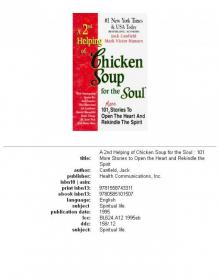 A 2nd Helping of Chicken Soup for the Soul
A 2nd Helping of Chicken Soup for the Soul Chicken Soup for the Nurse's Soul
Chicken Soup for the Nurse's Soul Chicken Soup for the Breast Cancer Survivor's Soul
Chicken Soup for the Breast Cancer Survivor's Soul Chicken Soup for the Pet Lover's Soul
Chicken Soup for the Pet Lover's Soul Chicken Soup for the Bride's Soul
Chicken Soup for the Bride's Soul A Chicken Soup for the Soul Christmas
A Chicken Soup for the Soul Christmas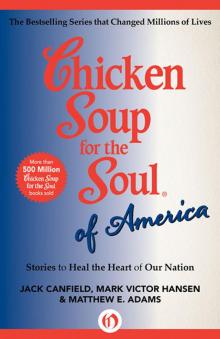 Chicken Soup for the Soul of America
Chicken Soup for the Soul of America Chicken Soup for the Teenage Soul on Tough Stuff
Chicken Soup for the Teenage Soul on Tough Stuff A Taste of Chicken Soup for the Teenage Soul III
A Taste of Chicken Soup for the Teenage Soul III Chicken Soup for Every Mom's Soul
Chicken Soup for Every Mom's Soul Chicken Soup for the Dog Lover's Soul
Chicken Soup for the Dog Lover's Soul A Second Chicken Soup for the Woman's Soul
A Second Chicken Soup for the Woman's Soul Chicken Soup for the Soul the Book of Christmas Virtues
Chicken Soup for the Soul the Book of Christmas Virtues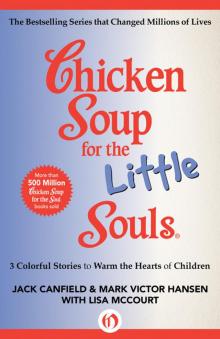 Chicken Soup for the Little Souls: 3 Colorful Stories to Warm the Hearts of Children
Chicken Soup for the Little Souls: 3 Colorful Stories to Warm the Hearts of Children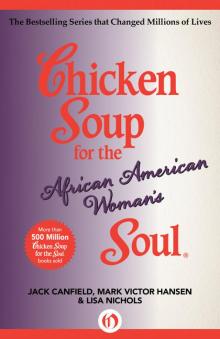 Chicken Soup for the African American Woman's Soul
Chicken Soup for the African American Woman's Soul Chicken Soup for the Soul
Chicken Soup for the Soul Chicken Soup for the Soul Celebrates Teachers
Chicken Soup for the Soul Celebrates Teachers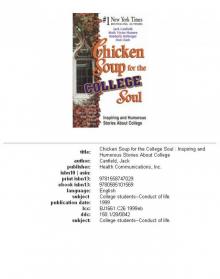 Chicken Soup for the College Soul
Chicken Soup for the College Soul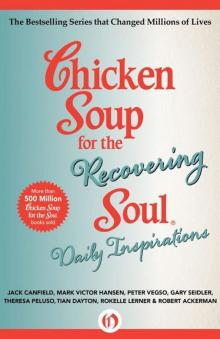 Chicken Soup for the Recovering Soul Daily Inspirations
Chicken Soup for the Recovering Soul Daily Inspirations Chicken Soup for the Soul Celebrates Sisters
Chicken Soup for the Soul Celebrates Sisters Chicken Soup for the Dieter's Soul
Chicken Soup for the Dieter's Soul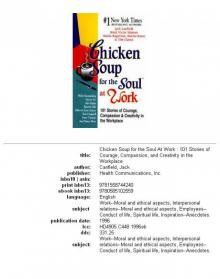 Chicken Soup for the Soul at Work 101 Stories of Courage
Chicken Soup for the Soul at Work 101 Stories of Courage Chicken Soup for the Beach Lover's Soul
Chicken Soup for the Beach Lover's Soul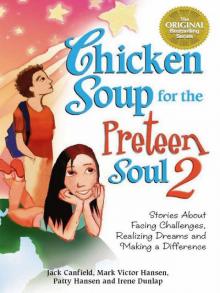 Stories About Facing Challenges, Realizing Dreams and Making a Difference
Stories About Facing Challenges, Realizing Dreams and Making a Difference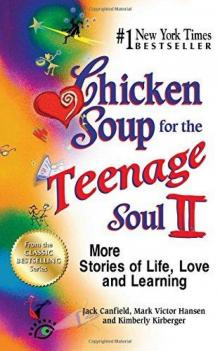 Chicken Soup for the Teenage Soul II
Chicken Soup for the Teenage Soul II Chicken Soup for the Girl's Soul
Chicken Soup for the Girl's Soul Chicken Soup for the Kid's Soul: 101 Stories of Courage, Hope and Laughter
Chicken Soup for the Kid's Soul: 101 Stories of Courage, Hope and Laughter Chicken Soup for the Woman's Soul
Chicken Soup for the Woman's Soul Chicken Soup for the Cancer Survivor's Soul
Chicken Soup for the Cancer Survivor's Soul Chicken Soup for the Canadian Soul
Chicken Soup for the Canadian Soul Chicken Soup for the Military Wife's Soul
Chicken Soup for the Military Wife's Soul A 4th Course of Chicken Soup for the Soul
A 4th Course of Chicken Soup for the Soul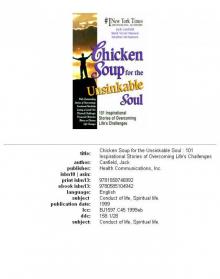 Chicken Soup Unsinkable Soul
Chicken Soup Unsinkable Soul Chicken Soup for the Soul: Christmas Magic
Chicken Soup for the Soul: Christmas Magic Chicken Soup for the Grandma's Soul
Chicken Soup for the Grandma's Soul Chicken Soup for the Soul: All Your Favorite Original Stories
Chicken Soup for the Soul: All Your Favorite Original Stories Chicken Soup for the Expectant Mother's Soul
Chicken Soup for the Expectant Mother's Soul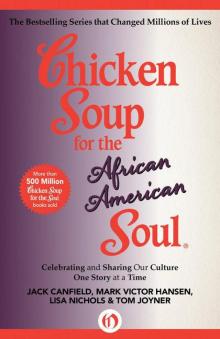 Chicken Soup for the African American Soul
Chicken Soup for the African American Soul 101 Stories of Changes, Choices and Growing Up for Kids Ages 9-13
101 Stories of Changes, Choices and Growing Up for Kids Ages 9-13 Christmas Magic
Christmas Magic Chicken Soup for the Soul: Children with Special Needs
Chicken Soup for the Soul: Children with Special Needs Chicken Soup for the Soul: Country Music: The Inspirational Stories behind 101 of Your Favorite Country Songs
Chicken Soup for the Soul: Country Music: The Inspirational Stories behind 101 of Your Favorite Country Songs Chicken Soup for the Country Soul
Chicken Soup for the Country Soul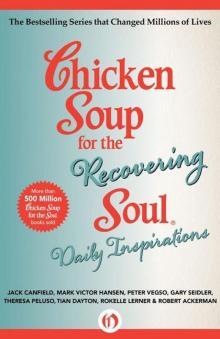 Chicken Soup for the Recovering Soul Daily Inspirations (Chicken Soup for the Soul)
Chicken Soup for the Recovering Soul Daily Inspirations (Chicken Soup for the Soul) A 3rd Serving of Chicken Soup for the Soul
A 3rd Serving of Chicken Soup for the Soul The Book of Christmas Virtues
The Book of Christmas Virtues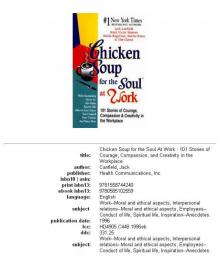 Chicken Soup for the Soul at Work
Chicken Soup for the Soul at Work Chicken Soup for the Soul 20th Anniversary Edition
Chicken Soup for the Soul 20th Anniversary Edition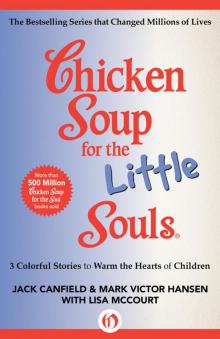 Chicken Soup for the Little Souls
Chicken Soup for the Little Souls Chicken Soup for the Soul: Reader's Choice 20th Anniversary Edition
Chicken Soup for the Soul: Reader's Choice 20th Anniversary Edition Chicken Soup for the Soul Christmas
Chicken Soup for the Soul Christmas Taste of Chicken Soup for the Teenage Soul III
Taste of Chicken Soup for the Teenage Soul III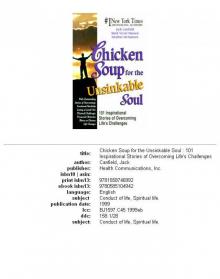 Chicken Soup for the Unsinkable Soul
Chicken Soup for the Unsinkable Soul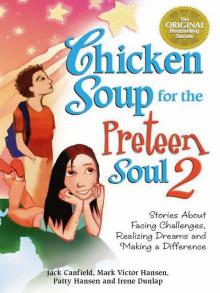 Chicken Soup for the Preteen Soul II
Chicken Soup for the Preteen Soul II